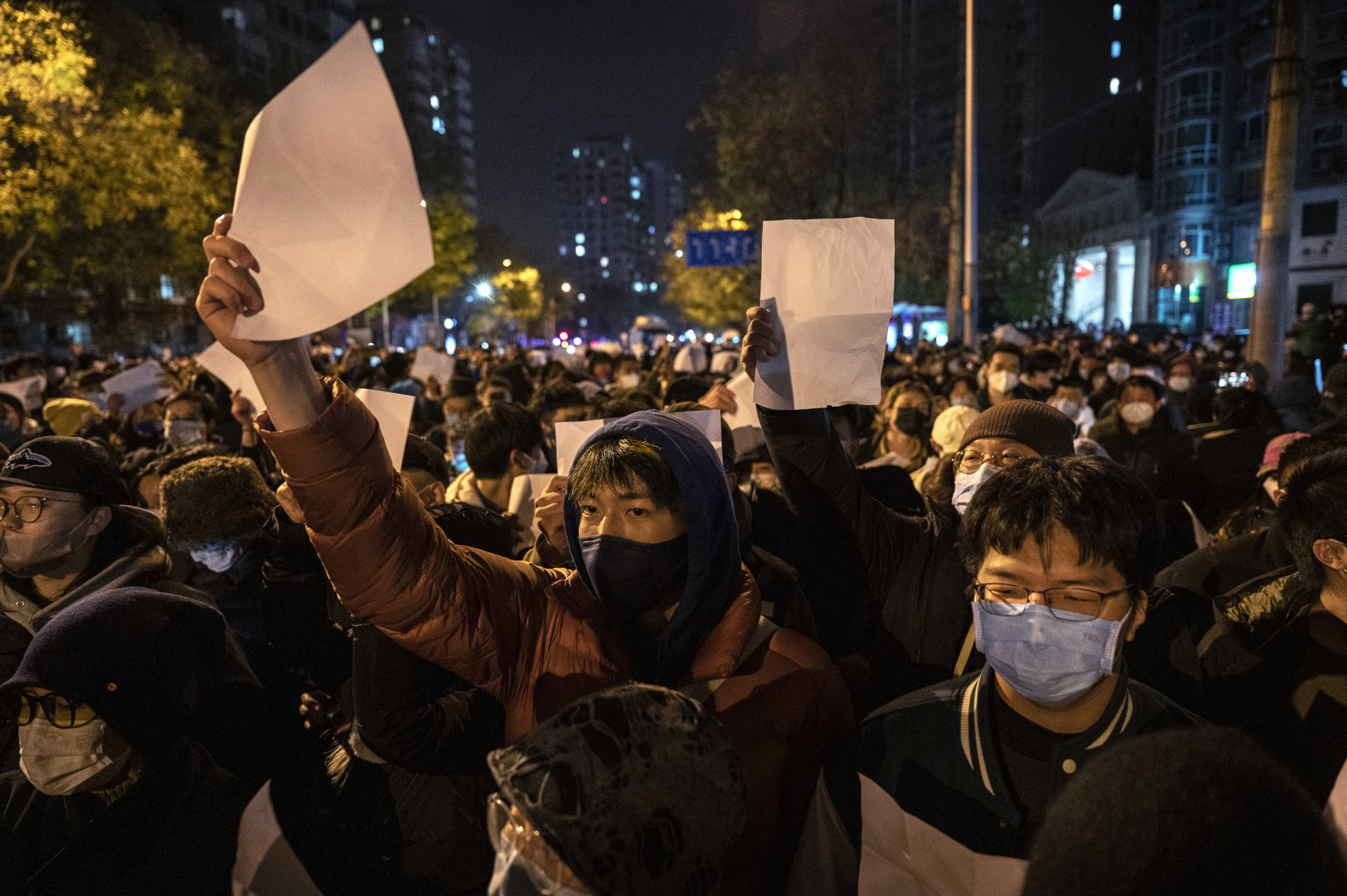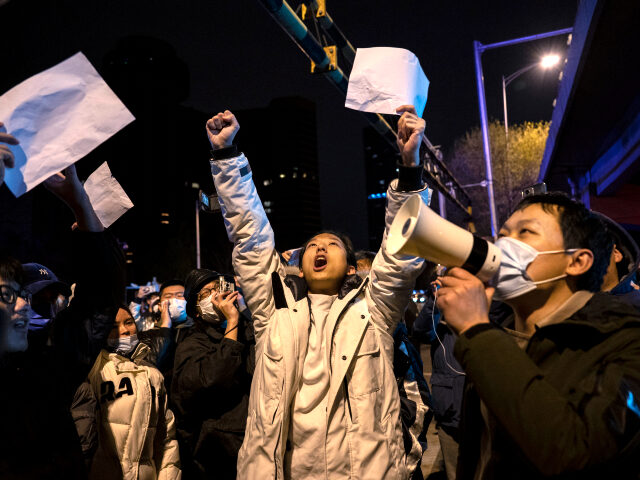The human rights organization Freedom House documented over 1,000 acts of protest in China between June and December 2022, attracting at least 23,000 participants nationwide, in a report released Tuesday – listing coronavirus lockdowns, the central Chinese real estate crisis, and general opposition to communist repression as fueling causes.
Freedom House’s China Dissent Monitor, launched last year, uses contacts within China, social media posts, local reports, and other sources to tally acts of dissent across the country, a project launched as a groundswell of anti-government activity took hold last year following the brutal lockdown of China’s largest city, Shanghai. The organization regularly emphasizes that even the large number of acts of protest – from marching in the streets to holding up posters to publishing dissident content online – is likely a significant undercount of the true total anti-regime activity in the country, as the Communist Party invests heavily in silencing these manifestations. Reports of any protests or other acts of dissent are particularly difficult to obtain from rural areas and occupied territories such as Tibet and East Turkistan.
In a series of events unprecedented in China since the student-led peaceful protests of the 1980s that culminated in the Tiananmen Square massacre, hundreds of people in the nation’s largest cities took the streets demanding an end to abusive lockdown policies in the last weekend of November. Photos and videos from Beijing, Shanghai, Chengdu, Guangzhou, Zhengzhou, and other cities showed crowds holding up blank pieces of paper – a protest against extreme censorship in the country – and chanting anti-regime slogans.
Several protests honored Peng Lifa, the man identified as having single-handedly hung a banner over Beijing’s Sitong Bridge calling genocidal dictator Xi Jinping a “dictator” and “traitor” during the once-every-five-years Communist Party Congress in October. Peng was arrested and his whereabouts remain unknown since the incident.
The Freedom House report published on Tuesday confirmed “1,080 dissent events since June 2022, 96 percent of which were offline acts, such as demonstrations, sign protests, and strikes.”
“At least 23,000 people cumulatively have participated in protest events. So far, 253 events were documented for the period from October 1 to December 5, 2022,” the report noted.
Freedom House detailed a variety of acts of protest, though dissent calling for an end to China’s lockdown policies was disproportionately represented. Since the Chinese coronavirus pandemic began in central Wuhan in late 2019, the Communist Party implemented sweeping lockdowns and forced the ill and those suspected of being infected into unsanitary, prison-like quarantine camps. The lockdowns often took hold without warning, to prevent city residents from fleeing, thus not giving residents time to stock up on food or basic medicine. Reports of starvation and medically avoidable deaths occurred throughout the country, though most prominently in East Turkistan, where the regime began a genocide of the indigenous Uyghur population prior to the pandemic that continues today.
“Analysis indicates that relative to other dissent, lockdown protests were larger, more likely to challenge the government, and more likely to result in arrests,” Freedom House noted.
The organization highlighted the wide variety of expressions of dissent from students on university campuses, which, from the data known to the outside world, were often more directly confrontational against the Communist Party. Freedom House noted that among the preferred protest slogans at student protests was the phrase “give me liberty or give me death,” popularized by American revolutionary leader Patrick Henry. Peng Lifa notably wrote “we the people,” the first words of the American constitution, on his bridge banners.

BEIJING, CHINA – NOVEMBER 27: Protesters hold up pieces of paper against censorship and China’s strict zero COVID measures on November 27, 2022 in Beijing, China. Protesters took to the streets in multiple Chinese cities after a deadly apartment fire in Xinjiang province sparked a national outcry as many blamed COVID restrictions for the deaths. (Photo by Kevin Frayer/Getty Images)
Blank papers were also popular in campus protests, as well as art projects targeting the lockdowns, including “an installation piece titled ‘Blowing in the Wind,’ which featured medical masks bound to a wooden structure, and another display in which masks stained with red liquid were tied to stair railings.”
In addition to anti-lockdown protests, many mass dissent events were in response to an ongoing banking crisis in Henan province partially triggered by real estate developers failing to build contracted new homes while demanding the owners of the land continue to pay mortgages. Henan was among the most active protest provinces as documented by the China Dissent Monitor.
The Henan banking crisis peaked with rural banks freezing the assets of their customers in April, prompting hundreds to attempt to storm the banks. Chinese officials deployed military tanks to protect the banks in July.
“Fresh videos have surfaced online in which Chinese Peoples Liberation Army (PLA’s) tanks can be seen deployed on the streets [of Henan province] to scare protestors. Large-scale protests are being held in the province by bank depositors over the release of their frozen funds,” Asian News International (ANI) reported at the time.
While Chinese authorities claimed that civil unrest in Henan had subsidized after local banks moved to resolve the crisis, the first documented riot of 2023 occurred in the province’s Luyi county, on its surface a protest against a local ban on New Year’s fireworks. Protesters flipped over police vehicles and flagrantly violated the anti-fireworks ordinance, as indicated in videos circulating through Chinese social media before regime censors could delete them.
Young man dancing on top of a police car & showing off his trophy: the plate of a police car he just took off during public's clashes with #CCP police when the cops tried to arrest ppl for setting off fireworks.
At Zhoukon, Henan Province, #China. Jan 2#ChinaProtests pic.twitter.com/c66zUHe0hS— Inconvenient Truths by Jennifer Zeng 曾錚真言 (@jenniferzeng97) January 3, 2023
The wave of protests seen in late November has yet to be repeated, as far as international news sources have been able to report, as Xi ordered a wave of mass arrests and repression following the display. Many young people, disproportionately women, have disappeared into prisons or psychiatric institutions in the ensuing months after being seen participating in protests or simply stating they support the protesters in public. Human rights groups have also documented government intimidation against attorneys suspected of being potential representatives for those who disappeared, hindering their rights to due process.
In his new year address, Xi Jinping made a rare concession to the existence of political dissent in the country, urging citizens to disregard it in the name of “unity.”
“Going forward, China will be a country that draws its strength from unity. Ours is a big country. It is only natural for different people to have different concerns or hold different views on the same issue,” Xi told the public. “What matters is that we build consensus through communication and consultation.”

COMMENTS
Please let us know if you're having issues with commenting.